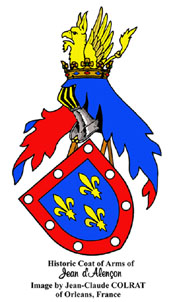 The 10th (approx.) Jean, the Duke of Alencon, a 23-year old handsome prince is at Saint Florent shooting quail, when he hears word that a girl has come to his cousin, the Dauphin, claiming a message from God.
The 10th (approx.) Jean, the Duke of Alencon, a 23-year old handsome prince is at Saint Florent shooting quail, when he hears word that a girl has come to his cousin, the Dauphin, claiming a message from God.Jehanne la Pucelle
A mini-biography
(Joan the Maid, commonly called Joan of Arc in English)
Compiled from many sources by Steven R. Kanehl
Part 3
 The 10th (approx.) Jean, the Duke of Alencon, a 23-year old handsome prince is at Saint Florent shooting quail, when he hears word that a girl has come to his cousin, the Dauphin, claiming a message from God.
The 10th (approx.) Jean, the Duke of Alencon, a 23-year old handsome prince is at Saint Florent shooting quail, when he hears word that a girl has come to his cousin, the Dauphin, claiming a message from God.
The 11th
– Jean D’Alencon goes to Chinon to meet Jehanne. Jehanne learns from Charles who he is and then greets him "You are very welcome. The more that are gathered together of the royal blood of France, the better." Jehanne would from then on often refer to him as "her good duke."
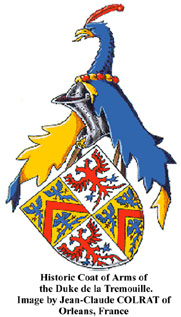 The 12th – D’Alencon, Charles and Jean hear mass together and then dine together, joined by Duke Georges la Tremoille. (La Tremoille is a close advisor to Charles, and reported to be the richest man in France. He also opposes Jehanne’s mission, preferring treaties). Jehanne later goes out to practice with her lance, and an admiring D’Alencon presents her with the gift of a horse.
The 12th – D’Alencon, Charles and Jean hear mass together and then dine together, joined by Duke Georges la Tremoille. (La Tremoille is a close advisor to Charles, and reported to be the richest man in France. He also opposes Jehanne’s mission, preferring treaties). Jehanne later goes out to practice with her lance, and an admiring D’Alencon presents her with the gift of a horse.
Mid March
– D’Alencon takes Jehanne to meet his wife at Saint Florent. She is the daughter of the Duke of Orleans, held captive in England for some 14 years now. The young wife fears for her husband’s safety, having just been ransomed from prison. Jehanne reassures her "Madame, fear nothing. I will bring him back to you as safe and well as he is now, or even better."
Mid-March
– Jehanne is taken to Poitiers for examination by the priests. She stays at the residence of Master Jean Rabateau. He has a little oratory in his house, where Jehanne frequently goes to pray. She appears in high spirits despite the many sessions of questions.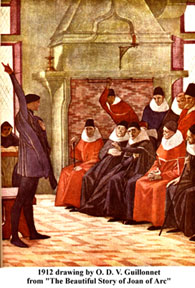
The examination records were lost or destroyed, perhaps even before the Rouen trial started. Still some of what happened is recorded. Jehanne tells the learned scholars, "I do not know A from B." (Jehanne is illiterate, but does learn to sign her name; three of her original letters bearing her signature still exist).
Frere Sequin, a Carmelite, and Professor of Theology at the University of Poitiers questions Jehanne. He has an unusual accent, one that Jehanne mistakes as a sign of a sort of "backwoods" person. He asks her what language the voices spoke. Jehanne replies, "A better language than yours." He asks her if she believes in God. She responds, "Yes, and better than you." He says that they cannot believe her just on her word and he asks her for a sign. She says, "In God’s name, I did not come to Poitiers to give signs! Take me to Orleans, and I will show you a sign and for what I am sent. The voice has told me that it is God’s will to deliver the people of France from the calamity that is upon them." Guillaume Aymerie (an examiner) answers, "If it be God’s will to deliver them, then there is no need for soldiers." Jehanne responds, "In God’s name! The soldiers will fight, and God will give the victory."
Jehanne tells them four points: the English will be destroyed after Orleans has been relieved and freed of their presence, the Dauphine would be crowned at Reims; Paris would be restored to French allegiance, and the Duke of Orleans would return to France from captivity in England.
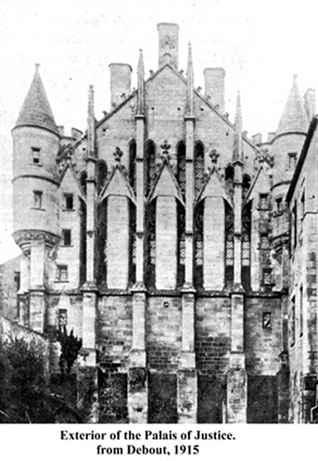
Tuesday, the 22nd
– While at Poitiers, Jehanne dictates a letter to the English. With a dramatic and handsome flare (although illiterate, she is extremely intelligent), the letter tells the English:"Acknowledge the summons of the King of Heaven. Render to the Maid here sent by God, King of Heaven, the keys of all the good towns which you have taken and violated in France. She is here come by God’s will to uphold the royal blood. She is very ready to make peace, if you will do justice, provided that France you return, and pay for having held it. And your archers, companions of war, men-at-arms and others who are before the town of Orleans, go away into your country in God’s name. And if so be not done, expect news of the Maid, who will come to see you shortly to your very great injury. King of England, if you do not so, I am chief-of-war and in whatever place I attain your people in France, I will make them leave it, will they or nil they. And if they will not obey, I will have them all slain; I am here sent by God, the King of Heaven (body for body), to drive you out of all France. And if they will obey I will be merciful to them.
And be not of another opinion, for you will not hold the kingdom of France from God, the King of Heaven, Son of St. Mary, but will hold it for King Charles, the rightful heir, for God, the King of Heaven so wills it, and that is revealed to him by the Maid and he will enter Paris with a goodly company. If you will not believe the news conveyed by God and the Maid, in what place soever we will find you, we shall strike and there make such a great battle cry that none so great has been in France for a thousand years, if you yield not to right. And believe firmly that the King of Heaven will send greater strength to the Maid than you will be able to bring up against her and her good men-at-arms, and when it comes to blows, it will be seen who has the right of the God of Heaven. You, Duke of Bedford, the Maid prays and beseeches you not bring on your own destruction. If you grant her right, still may you come into her company there where the French shall do the fairest deed that ever was done for Christendom. And make answer if you wish to make peace in the city of Orleans. And if you make it not, you shall shortly remember it, to your great injury."
The examiners give their report. Sequin reports "We decided that, in view of the imminent necessity and of the danger of Orleans, the King might allow the girl to help him and might send her to Orleans." Another chronicler reports that the things which she told them seem very strange, so strange, that the court of enquiry comes to the decision that the Dauphin might be recommended to put his trust in her.
Jehanne returns to Chinon but more delays will come in April.
Saturday, the 2nd
– Jehanne says her angelic voices have told her the location of a sword near the altar at the church of Sainte-Catherine-de-Fierbois. An armorer is dispatched to find the sword. They dig it up. It is covered with rust, but the rust easily falls off once the sword is rubbed. The sword has five crosses on it. Some surmise the sword is some 700 years old or more and left from French hero Charles Martel. Faith in Jehanne’s mission increases by a hundred-fold with the miraculous discovery of this sword.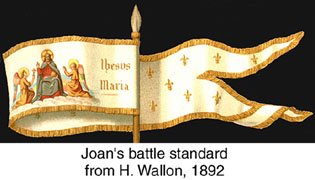
Tuesday, the 5th
– Jehanne leave Chinon for Tours. She stays at the house of Jean Dupuy. Her form-fitting armor is produced, weighing some 60 pounds. Her standard and pennon are also produced.A brief description of her standard and pennon is as follows. Jehanne would say she loved her standard 40 times more than her sword. It is symbolic of Christ’s lordship over her whole mission. It is painted (not embroidered) by Hauves Poulnoir (really a Scotsman named Hamish Power). He is paid 25 livres tournois for the standard and smaller pennon. The large standard is of white satin. It pictures Christ seated on the globe, supported by two angels, the groundwork being sprinkled with the golden lilies of France. It contains the heading "Jhesus Maria." The smaller pennon depicts the Annunciation, with an angel offering a lily to Mary.
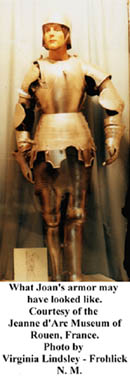
Jehanne undergoes yet another medical exam, with the Queen of Sicily, Charles’ mother-in-law in charge, aided by other women. They again report as to her virginity. Part of the fascination with her virginity, apart from helping believe that she is telling the truth, is the belief that the Devil could have no dealings with a virgin.
Jehanne is given her own priest, Jean Pasquerel. Pasquerel had met Jehanne’s mother on a pilgrimage several weeks before and she helped make the arrangements. Jehanne is given a servant, Jean d’Aulon (described by the Bastard of Orleans as "the most honest man in the French army"), another page named Raymond (to go along with Louis de Contes), and two heralds. Her brothers Pierre and Jean come from Domremy to join the army.
The March 22nd letter is dispatched to the English sometime in April.
Tuesday, the 12th
– A Flemish envoy living in Lyon writes a letter home to Brussels. The letter describes in detail that he has heard it said the occasion on which Jehanne knows she will be wounded, but not die, at Orleans by an arrow above her breast.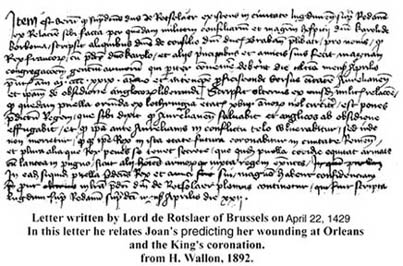
Thursday, the 21st
– Jehanne leaves Tours for Blois to join the royal army. The banner for the priests to carry is produced.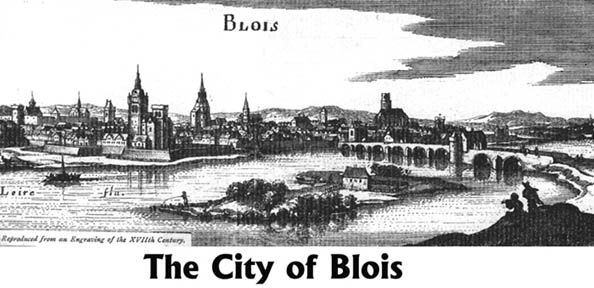
Jehanne takes great pains to sanctify her army from sin. She bans all camp followers (prostitutes) and directs that anyone living with a mistress must either marry them or send them away. She prohibits taking God’s name in vain, but does allow two expressions of an oath "In God’s name" and "By my staff". She tells the soldiers they must not loot and pillage when they occupy a town. She encourages them all to receive the Eucharist, but first they must confess their sins to God.
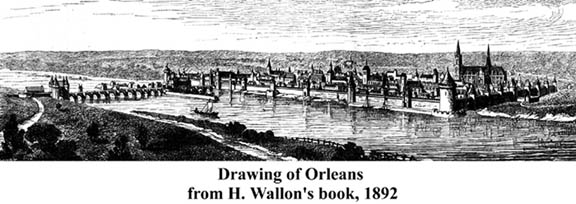
Wednesday, the 27th
– Jehanne, the army of some three to four thousand men and the relief supplies, leave Blois for Orleans. The priests lead the way carrying their banner and singing the song Veni Creator Spiritus (Come Divine Spirit). The supplies include 400 head of cattle. They travel on the south bank of the Loire river. Jehanne sleeps that night in her armor and awakens the next day tired and sore, but in good spirits.
Thursday, the 28th
– They arrive late that day at Orleans. It is pouring rain. Jehanne first realizes that the bulk of the English are on the other side of the river and is angry and disappointed. The Bastard of Orleans crosses the river in a small boat to greet her.Jehanne: "Is it you who are the Bastard of Orleans?"
Bastard: "I am, and I rejoice in your arrival."
Jehanne: "Is it you who advised them to bring me here by this bank of the river, instead of sending me straight to Talbot and his English?"
The Bastard replied that he and others wiser than himself, had given this advise, believing it to be the best and the wisest.
Jehanne: "In God’s name! The counsel of Our Lord is wiser and better than yours. You thought to deceive me, but you have deceived yourselves, for I bring you the finest help that ever was brought to knight or to city, since it is the help of the King of Heaven."
The Bastard succeeds in calming Jehanne down. He tells her of the plan to ferry the supplies across the river at Checy, about five miles from Orleans and come into the city from the lightly guarded east side.
The plan seems to go awry as the wind is blowing in the wrong direction for the boats to cross. Jehanne tells them to wait a little while; all would be well as the wind would change. And suddenly, the wind changes! All are amazed by this prophecy and faith in Jehanne’s mission grows. The supplies are ferried across the river. The army, too numerous to risk an extended crossing by boat, return to Blois to cross the bridge there and return to Orleans via the north bank of the Loire. Jehanne is reluctant to have them leave, but the captains say, "Jehanne, go in surety, for we promise to return to you before long."
Jehanne spends the night in the house of Gui de Cailly. He apparently shares in the angelic visions of Jehanne that night, the only person ever recorded to have done so. (Jean d’Aulon would pray to be able to see the visions, but Jehanne tells him the angels say he is not righteous enough, so he stops praying for this). Two months later Gui de Cailly is ennobled by Charles in a document couched in the strangest language of fantasy and heraldry combined.
Friday, the 29th
– Jehanne enters Orleans at the Burgundy Gate near dusk riding on a white horse. From the journal of the siege: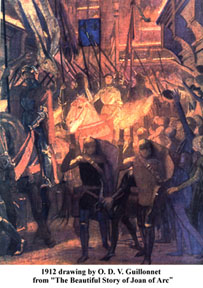
"And so she entered Orleans, with the Bastard of Orleans at her left, very richly armed and mounted; afterward came other noble and valiant lords; squires, captains, and men-at-arms, as well as some from the garrison and bourgeoisie of Orleans who had gone ahead of her. From the city, other men-at-arms came to receive her, along with bourgeois of Orleans, carrying many torches and making such joy as if they had seen God himself descend among them; and not without reason, for they had endured much difficulty, labor, pain, and fear of not being rescued and of losing all their bodies and goods. But they felt already comforted, as though freed of the siege by the divine virtue that they were told resided in that simple Maid, whom they regarded with strong affection, men as much as women and little children. And there was a marvelous crowd pressing to touch her or the horse on which she rode. One of those bearing torches came so close that her standard caught fire, so she spurred her horse, turning him gently toward the pennant. She put out the fire as easily as is she had long war expertise; the men-at-arms considered this a great marvel, as did the citizens of Orleans, who accompanied her throughout the city, making great joy, and with a great deal of honor they conducted her up to the Renard Gate, to the resident of Jacques Boucher, then treasurer of the captive Duke (of Orleans). There she was joyously received with her two brothers (Jean and Pierre) and two other gentlemen and their valets, who had come with her from the Barrois.
Jehanne tells the citizens of Orleans, "My Lord has sent me to help this good town of Orleans. Hope in God. If you have good hope and faith in Him, you shall be delivered from your enemies."
Once inside, Jehanne takes off her armor. She is exhausted and eats only 5 or 6 pieces of bread, dipped in a silver cup mixed with a little wine and water. She sleeps with the 9-year old daughter named Charlotte (some time later Jehanne will give Charlotte one of her hats. The hat stays in the Boucher family for some 350 years before it is destroyed in the late 18th century in the French revolution). 
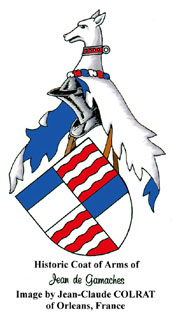
A dispute breaks out with an army captain sieur de Gamaches. He protests to the Bastard, "Since you give more heed to the advice of a little saucebox of low birth than to a knight such as myself, I will no longer protest; when the time and the place come, my good sword will speak; I may meet my end in the doing, but the King and my honor demand it. Henceforth I lower my banner and am no longer anything than a simple squire. I prefer to have a noble man as my master rather than a hussy who may once have been God knows what." He furls his banner and gives it the Bastard. The other captains intervene, calm him down and persuade both he and Jehanne to kiss each other on the cheek, which they both do with extreme reluctance.
La Hire takes some troops and townspeople to harry the English at Fort Paris (on the north side). This "military action" was fairly routine during the siege and probably unknown to Jehanne. A small skirmish breaks out threatens to become a large battle, but both sides quickly retreat; the English to their fort and the French to the town.
Jehanne goes out to view the English fortifications. She yells out to them to leave in God’s name to spare their lives. They insult her, calling her a "cowherd", and threaten to burn her if they capture her.
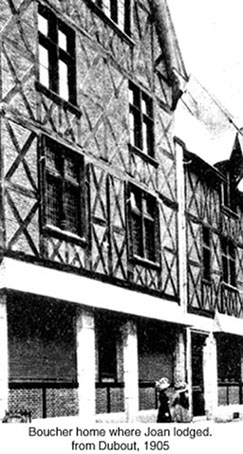
Sunday, the 1st
– The citizens of Orleans practically break down the door of the house where Jehanne is staying. Jehanne mounts a horse and spends much of the day riding about the city to the acclaim of its inhabitants. The Bastard leaves Orleans to go to Blois to see about the army’s return.
Monday, the 2nd
– Jehanne goes out on horseback to inspect the English positions. A crowd of people follow her, happy to see and surround their new found hero. The English do not attack. She hears vespers at the cathedral of Sainte Croix.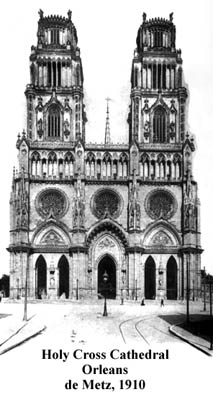
Tuesday, the 3rd
– Jehanne celebrates the Feast of the Finding of the Holy Cross. There is a procession in the city. Late in the day the returning army from Blois is sighted from a lookout tower. Some garrisons of French soldiers from other cities also arrive.
Wednesday, the 4th
– At dawn, Jehanne takes an escort of 500 men out to greet the army. They enter Orleans without an attack from the English. The Bastard tells Jehanne that he hears that John Fastolf is bringing reinforcements and is already at Janville (about a day away – this report turns out to not be true; Fastolf is still in Paris and does not leave for over a month). Jehanne seems full of joy at the news and replies, "Bastard, O Bastard, in God’s name, I order you, as soon as you know of Fastolf’s coming, to let me know it, for if he should pass by without my knowing it, I promise you that I will have your head cut off." (Most believe Jehanne was, of course, joking). The Bastard replies that she should have no doubts on that score, for he would indeed let her know.
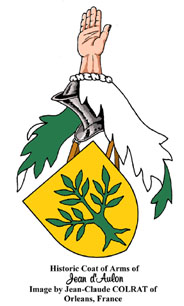 They eat dinner (the noonday meal). Jehanne retires to take a nap. She is awakened by her voices. She tells her steward d’Aulon, "In God’s name, my advice has told me that I must go against the English, and I don’t know if I should attack their fortifications or Fastolf, who is coming to resupply them." She shouts to her page Louis de Coutes: "Ah, awful boy! You did not tell me that the blood of France had already been spilled." (Some speculate that either she did not know the French were going to attack that day, or else she was not aware of the timing of the attack or surely she would not have been resting). Jacques Boucher’s wife and daughter Charlotte rush in to arm her, while the page goes to saddle her horse. Jehanne mounts her horse and then realizes her standard is still inside. She impatiently shouts for it and it is handed to her through a window. Jehanne goes off at a gallop; at such as pace that the horse’s hooves send up sparks on the paved road. She meets a badly wounded French soldier at the Porte de Bourgogne. Jehanne exclaims that she could never see French blood spilt without her hair raising on her head.
They eat dinner (the noonday meal). Jehanne retires to take a nap. She is awakened by her voices. She tells her steward d’Aulon, "In God’s name, my advice has told me that I must go against the English, and I don’t know if I should attack their fortifications or Fastolf, who is coming to resupply them." She shouts to her page Louis de Coutes: "Ah, awful boy! You did not tell me that the blood of France had already been spilled." (Some speculate that either she did not know the French were going to attack that day, or else she was not aware of the timing of the attack or surely she would not have been resting). Jacques Boucher’s wife and daughter Charlotte rush in to arm her, while the page goes to saddle her horse. Jehanne mounts her horse and then realizes her standard is still inside. She impatiently shouts for it and it is handed to her through a window. Jehanne goes off at a gallop; at such as pace that the horse’s hooves send up sparks on the paved road. She meets a badly wounded French soldier at the Porte de Bourgogne. Jehanne exclaims that she could never see French blood spilt without her hair raising on her head.
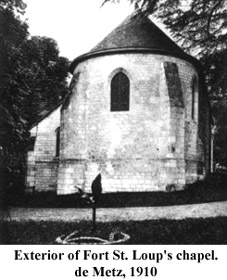
She arrives at the battle scene at the fort at Saint Loup (slightly over a mile away on the eastern side of Orleans). The battle is fully engaged. The French, on seeing Jehanne, shout in triumph and carry the fort. They burn and demolish the fort, killing 114 English and capturing another 40. Talbot attempts a sortie from the Bastille de Saint Pouair (north of Orleans), but quickly retreats when he encounters 600 French soldiers. Jehanne is distressed at the many dead, that so many English should have died without first going to confession, especially on the eve of Ascension. She deplores their fate, and, as though she holds herself responsible, immediately summons Pasquerel to confess her. She orders all the soldiers to give thanks to God and tells them, "Let none tomorrow dare to leave the town and go out to fight, unless he has first gone to confession. And let them beware lest women of evil fame follow them; because, for sin, God will permit the loss of this war." All the church bells of Orleans ring out to celebrate the victory.